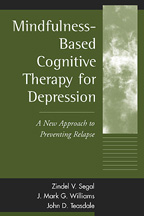We’ve known for some time that mindfulness-based cognitive therapy is an effective treatment for preventing further episodes of depression for people who have mad multiple episodes of depression.
The pioneering work of Zindel Segal, Mark Williams, and John Teasdale has integrated the best of cognitive behavioral therapy with insights and formats of Jon Kabat -Zinn’s mindfulness-based stress reduction (MBSR) to create mindfulness-based cognitive therapy (MBCT).


Their work is detailed in readerly fashion in the treatment manual, Mindfulness-Based Cognitive Therapy for Depression and in the general audience The Mindful Way Through Depression, co-authored with Jon Kabat-Zinn.
A recent study published in the Archives of General Psychiatry adds more data to support the efficacy of MBCT. Patients with depression were treated with medication. About half of these patients went into remission. Of these, some were considered to have “unstable” remission, in that they had residual symptoms. For these patients, those maintained on medication had similar rates of remission as those maintained on MBCT.
This finding is important because not everyone can or is willing to continue medication after their depression improves. MBCT provides important skills with no side effects.
How does MBCT work? Patients develop the skills to monitor their feelings and thinking and to understand their interrelationship. They learn that normal variations in mood, such as sadness, can activate thought patterns consistent with depression. If those thought are pursued, or identified with, a spiral into depression can occur. So, patients learn to “disidentify” from these thoughts while they also learn mindfulness skills of paying attention to sensations in the body.
Whenever we are paying attention to sensations in the body we aren’t pursuing stories that can get us into trouble. That’s the key for averting all sorts of anguish, including depression.
